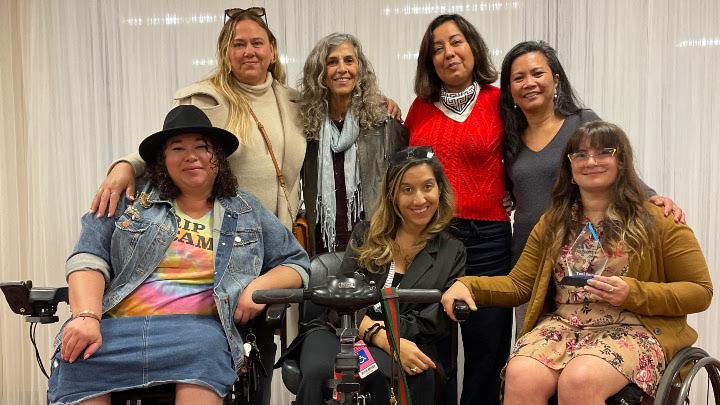Creating space for disabled people to be ‘unapologetically themselves’
Assistant professor Toni Saia earns inaugural Judy Heumann Civil Leadership Award from San Diego disability organization.

To the world, the late Judy Heumann is widely known as the "Mother of the Disability Rights Movement." To Toni Saia, an assistant professor of rehabilitation counseling at San Diego State University, the renowned civil rights activist was much more.
Saia was a starstruck undergraduate at the University of Arizona when Heumann, a fellow wheelchair user, came for a speaking engagement. The two swapped phone numbers and stayed in touch. Every so often, a text message from Heumann would light up Saia's phone, often posing a short, but significant question.
"What are your dreams?"
Saia says she would often spend days trying to craft the perfect response. Once she did, another message from Heumann unfailingly would appear from the ether.
"All possible."
Those special moments were on Saia’s mind as she was honored on March 1 with the inaugural Judy Heumann Civil Leadership Award from the Indoor Sports Club — a club that has fostered community among disabled folks in San Diego for nearly a century — and the anti-ableist production company Cripple Productions.
"It was that push for me,” Saia recalls about her interactions with Heumann, who died in 2023. “Coming from another disabled woman, that was just unbelievable.”
Unapologetically Themselves
Since her arrival on campus in 2021, Saia — an advocate for understanding disability as a community and culture rather than a diagnosis — has fought to bring visibility and voice to the disability community at SDSU. In addition to her research and work training future vocational rehabilitation counselors, she serves as co-chair of SDSU’s Disability Employee Resource Group.
The Judy Heumann Civil Leadership Award reflects the work Saia has done to build a community for disabled people in the wider San Diego region. In the past year, she had become heavily involved in the Indoor Sports Club in a collaborative effort to revamp its mission to match the current goals of the disability community.
Last summer, Saia and others launched a monthly hangout for local disabled folks dubbed “Crips and Shit” — a very intentional reclaiming of an ableist slur. The gathering has been popular, drawing 30-to-40 people each time, with some guests traveling from Los Angeles and booking hotel rooms just to attend.
The hangouts reflect the diversity of the disability community. Many are wheelchair users, but not all. Some folks bring personal care attendants, some have non-apparent disabilities, and others are members of the Deaf community. The disability hierarchy that often exists in other spaces is removed.
"Disabled people don't get a lot of opportunities to be unapologetically themselves,” Saia said. “We are constantly mingling in a world that's not made for us. When we can be in space where you can just be, it's electric. The energy is palpable. It's also affirming.”
Here to Stay
As she was honored on March 1, Saia was supported by several members of the SDSU community in attendance, including her students and fellow faculty members. She added that she was particularly delighted for the chance to bring her non-disabled colleagues “to my turf.”
"When I got the award, it meant so much more to me because this is the kind of community that I've fostered,” she said. “When I looked out over the crowd, it was my people — in a lot of different ways."
In the moment, Saia also reflected on the women who empowered her. That includes her mother, who did not let her fall prey to the low expectations of society. And, of course, Judy Heumann — the person who made her believe all was possible.
"I really feel like I embody a lot of Judy's energy," Saia said. "We have different approaches, for sure, but it's our fight and our belief. We just unapologetically believe that disabled people are here and we're here to stay."



